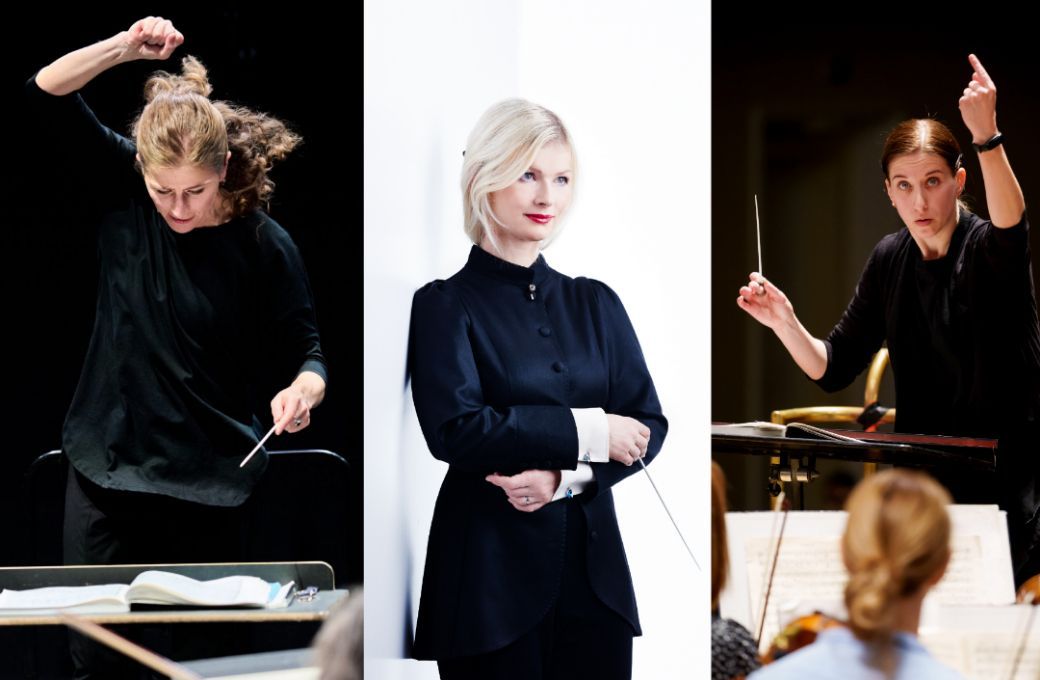Despite a small population, Estonia has produced some remarkable musicians. Anu Tali, Kristiina Poska and Maria Seletskaja are part of a generation of Estonian conductors making their own way in a world that tends to expect conductors to look – and behave – a little differently.

Each has followed a unique and organic path into the world of conducting. Kristiina Poska is chief conductor of the Flanders Symphony Orchestra. “It was always one step after the other,” she says. “I think everything that is connected to music has been my own initiative. … It was not like I was ten years old and I knew I wanted to become a conductor, nothing like this at all, I was just slowly discovering by already doing it, that this is something that is mine.”
By contrast, Maria Seletskaja, current conductor-in-residence at the National Ballet of Canada, is a dancer by training. She didn’t initially have a long-term vision either: “As a person who came into the conducting world from the outside, I had little to no thought about how far will I make it. The doubts and questions that were eating me alive were how to learn sufficiently, so that nobody could point a finger at me and say that I was an imposter, just a dancer who had learnt to wave her arms.” She adds: “There was so much to catch up on that thinking about the final destination was not on my list.”
Meanwhile, for Anu Tali, who has been musical director of the Nordic Symphony Orchestra for nearly thirty years, not following a single clear-cut path, and not giving herself a label, has allowed a certain freedom. “I think it’s liberating, not to decide what you’re going to be, because I think that comes with a lot of pressure.” For many years, she didn’t call herself a conductor, rather “I always said ‘I’m conducting’”.
The three women reference the rich musical tradition of Estonia as a fertile space in which they grew as musicians. Especially important has been the Estonian music education system, granting young people the opportunity “to learn music from the inside,” in Tali’s words. “Each student is entitled to two private instrument lessons, two group lessons of solfège and a one choir session a week,” Seletskaja explains. “What I believe is absolutely amazing,” she goes on, “is that tuition is available to literally anyone. In some countries, one can study only if parents can afford years of private lessons. In Estonia, you can get highly qualified teachers, if only you want to study and learn.”
Growing up in a small country comes with its pros and cons. “In Estonia, many great things can be achieved more quickly: society is smaller, things are easier to turn around,” Tali tells me. “Dreams are fulfilled at a faster pace.” Kristiina Poska, who moved away from her home country when she was 25 and returned some 15 years later, says: “You know how it is – as a young person, you always want to go somewhere else, because you think somewhere else everything will be better. And then you get older, and you feel that your homeland grows more and more important.” From leaving with no plan to return, she has come round to not being able to imagine living elsewhere. Even when abroad, Poska adds wryly, “my scores are still in Estonia.”
Tali describes growing up in the Soviet era as a time that helped her to dream, since the field of possibilities felt entirely open: “I had nothing to compare with. This made me quite strong.” Years later, during the heady first post-Soviet days, Estonia was “a free country with great hopes and dreams, which had made no mistakes yet”, where she was able to make a space for herself. With the benefit of hindsight, she can see how many of those illusions collapsed, yet in those early years, she says, “young people had an incredibly strong say in things, and that built up our independent thinking.”
Far from the image of the solitary maestro, Tali describes standing in front of an orchestra as “incredibly powerful”, finding great pleasure in making music as part of a group. “A hundred people together doing the same thing, it’s like a mantra, like a prayer, it’s an incredible power.” Poska, too, sees this “energetic exchange” as being at the heart of her work. “When you are able to reach … how you imagine this particular piece should sound, and everybody is surfing on the same wave – there is nothing more beautiful in life than that. It’s absolutely incomparable.”
Maria Seletskaja also speaks with great warmth of her work. “Being able to make music is the greatest joy. To have a fulfilling career after one in ballet, to find one’s true calling, and to be lucky enough to be able to practice it, is worth gold. I shall never take any moment on a rostrum for granted.”
The three women speak openly about the difficulties of their chosen paths, but also their many joys and triumphs. Tali describes the “sobering” experience of studying conducting in St Petersburg, preparing her first major works and finding it difficult to imagine how any conductor could sustain the amount of energy demanded. “In the beginning,” she says, “it takes everything. You can’t imagine that you’ll be able to do it, week in week out.” She continues: “When you’re young, everything is at stake. You think it’s the last time you’ll get a chance. You don’t have that experience telling you that there’s another round coming.” The daily schedule is something that Seletskaja, too, struggles with: “My biggest challenge is squeezing my duties and delights into twenty-four hours every day. I never have enough time.”
Kristiina Poska describes many of the struggles she faced along her career path as being internal rather than external. She sees herself as a perfectionist, with a tendency to ask “impossible things” of herself. She adds: “Maybe this is where the gender topic comes into play – we have these pictures in our head of how a conductor should look, and this image is normally an older man who has certain qualities and does certain things. Unconsciously I think I had a certain idea of how I thought a conductor should be.
“In Estonia we say one has ‘scissors’ – a conflict. On the one hand, the way you think you should be, and on the other how you really are. Accepting myself has been a big obstacle to overcome.” Poska now understands that there are many individual ways to be successful as a conductor. “In the end, if you fight against your own nature, you will never win this battle.”
None of the three conductors deny that they are still facing an uphill struggle as women in a male-dominated world – but they highlight above all the evolution they have witnessed over the past two decades, and their hopes for the future.
Tali says she is grateful that times have changed, but she cautions her colleagues and successors against complacency. “When we place ourselves as women on the side of being the lucky ones, belonging to the guys, being accepted, being grateful, being on the right side, then we change the world for the worse.”
Poska, meanwhile, warns aspiring young conductors against thinking that things will be easy. “This job is tough, and it needs complete dedication,” she says. “One should not take one’s support for granted. One should always keep the deepest respect for the music and for the score, and always be prepared, because people often still measure women a little bit differently.” Alongside this gentle warning, she advises women to have self-belief, and fight against the instinct to belittle themselves or give in to low self-esteem. “Thankfully,” she adds, she can see this changing in the next generation of young women: “it’s beautiful to see.”
Tali’s advice for those who follow in her footsteps is warm and encouraging: “Don’t lose your courage,” she says. “Live your life. We women often think we have to make rules for ourselves – never do this, never do that, never have a family.” She thinks this mindset is outdated: “Life has changed so much, for all of us.” Her advice, then, is to “live your life in music and with music, instead of thinking of it only as a career.”
The three conductors describe following each other’s progress with interest, keeping in touch over email, recommending each other for new opportunities, supporting each other and fighting for each other. As Tali puts it: “Because it’s such a lonely profession, it gives you strength, and calms you down, these people having the same thoughts and doubts and dreams and ideas. It makes you stronger.”
Click to see forthcoming performances by Anu Tali, Kristiina Poska and Maria Seletskaja.
This article was sponsored by the Estonian Ministry of Culture.


